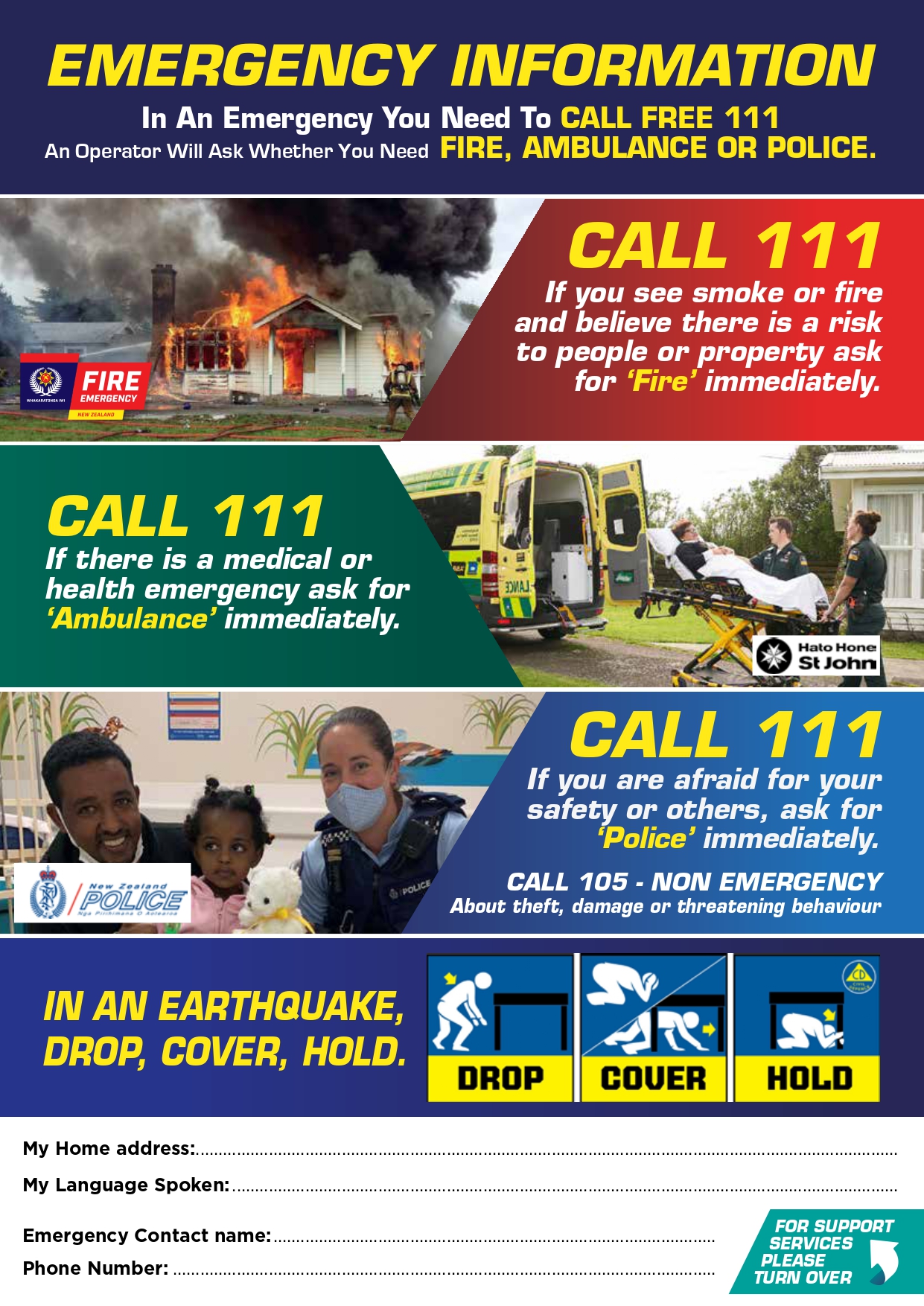Emergency information
Emergency information
NATIONAL EMERGENCY PHONE NUMBER: 111 this is always a free call, it will work even if you don't have credit on your phone, and will connect you to the fire service, police and ambulance.
If you would like an emergency poster to stick on your fridge, you can find them at the Ashburton Library (2 Baring Square East) or at the Hakatere Multi Cultural Council (255 Moore Street, Ashburton). These posters have been translated into nine different languages.
| English | Te Reo Māori | Spanish / Español |
| Nepali / नेपाली | Farsi/Dari / فارسی | Tongan / Lea Faka-Tonga |
| Samoan / Gagana Sāmoa | Tagalog | Hindi / हिंदी |

In case of a disaster (earthquake, flooding, cyclone, etc.) you may need to look after yourself for at least seven days before the emergency services can reach you. Make sure you have enough water and food stored for you and your family. You can find more information about how to prepare for an emergency here
If you have a mobile phone, you will automatically be sent an Emergency Mobile Alert if it is a serious risk, you can also text your postal code to "4196" to receive local information as soon as possible. This service is free, and you can opt out whenever by texting STOP.
- In a medical emergency, call 111 and ask for "Ambulance".
- Call Healthline on 0800 611 116 if you are unsure.
- For the hearing or speech impaired, you can register for 111 TXT.
When you call 111 you will speak to a professional who will make sure you or the person you are calling for receives the right care at the right time.
What to do when your 111 call is answered
Ask for Ambulance. Say which service you need – Police, Fire or Ambulance. Ask for Ambulance. Your call will then be transferred to them.
Give the address of the emergency. Tell the call handler exactly where the emergency is taking place. Give as much information as you can including the house number and street name, or the name of the business.
Give the phone number you are calling from. They will ask you to give the phone number you are calling from; in case they need to call you back.
Describe what has happened. Tell the call handler what has happened. They will ask you questions like “Are you with the patient?” “How old is the patient?” “Is the patient awake?” “Is the patient breathing?”.
Listen to what to do next. While you talk to the call handler, someone called a ‘dispatcher’ will be arranging help. The call handler will tell you what to do next. If necessary, they will stay on the line to help you until an ambulance or other help arrives.
Stay on the call. Do not hang up the call until the call handler tells you to. They will make sure that you have the help you need first.
Hato Hone St John has Stations in Mayfield, Methven & Ashburton containing Ambulances that are manned by both Volunteers & Paid staff.
For non-emergency general inquiries regarding Hato Hone - St John, visit the Hato Hone St John website https://www.stjohn.org.nz/ or call 0800 785 646.
Their local office at 241 Tancred Street - Ashburton is open from 9am - 2pm Monday - Friday (except public holidays) Phone 03 307 4221.
The government funds 90% of the ambulance service, but there is a cost if you use the ambulance. This is about $100 for citizens, residents and people on work visas eligible to stay in New Zealand for at least two years.
If you see smoke or fire and believe there's a risk to people or property, call 111 and ask for 'Fire' immediately. If you're not sure whether it's a real emergency or not, call 111 and ask.
When in doubt, call 111.
What you need to tell Fire and Emergency New Zealand
When you call 111, an operator will ask whether you need Fire, Ambulance or Police.
Ask immediately for 'Fire'. Ambulance and Police may also attend but the first priority is to get a fire engine on the way.
Always call 111 if you need a fire engine. Don't call your local fire station.
You'll need to give the operator the following information to help us find the fire:
- House number
- Street name
- Nearest intersection
- Suburb and city
- Rural Address Property Identification (RAPID) number if you have one.
Once they know the location of the fire, they'll ask about the nature of the emergency. They'll probably ask if anyone is injured or trapped. This will help them make sure the first responders are ready to act when they arrive.
Call 111 and ask for Police when:
- People are injured or in danger; or
- There is a serious, immediate, or imminent risk to life or property; or
- A crime is being or has just been committed and the offenders are still at the scene or have just left.
If you can’t decide if it’s a real emergency and you’re still worried, call 111 and ask the operator. They will help you work out what to do.
Reporting options for non-emergency situations are available via the Police Non-Emergency service
Alternative Police contacts for non-emergency situations can be accessed on the Police website or by calling 105.
